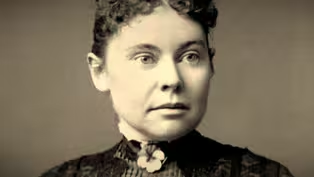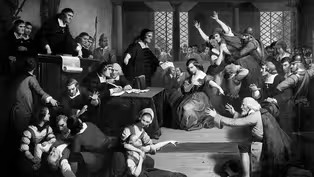
H.P. Lovecraft
Clip: Season 4 Episode 44 | 11m 44sVideo has Closed Captions
Famous, local horror writer H.P. Lovecraft had a frightening flaw that may shock readers.
Providence’s famed writer H.P. Lovecraft has been dubbed the “Father of Cosmic Horror” and is read by fans worldwide. The writer is enjoying a posthumous renaissance as a major influencer –but he harbored an insidious dark side that is hard for readers to ignore.
Problems playing video? | Closed Captioning Feedback
Problems playing video? | Closed Captioning Feedback
Rhode Island PBS Weekly is a local public television program presented by Ocean State Media

H.P. Lovecraft
Clip: Season 4 Episode 44 | 11m 44sVideo has Closed Captions
Providence’s famed writer H.P. Lovecraft has been dubbed the “Father of Cosmic Horror” and is read by fans worldwide. The writer is enjoying a posthumous renaissance as a major influencer –but he harbored an insidious dark side that is hard for readers to ignore.
Problems playing video? | Closed Captioning Feedback
How to Watch Rhode Island PBS Weekly
Rhode Island PBS Weekly is available to stream on pbs.org and the free PBS App, available on iPhone, Apple TV, Android TV, Android smartphones, Amazon Fire TV, Amazon Fire Tablet, Roku, Samsung Smart TV, and Vizio.
Providing Support for PBS.org
Learn Moreabout PBS online sponsorship(eerie music) - He has this famous quote, "The oldest and strongest emotion of mankind is fear, and the oldest and strongest fear is fear of the unknown."
- [Pamela] Fear creeps throughout the pages of some 66 short stories written by HP Lovecraft.
His supernatural tales published in pulp magazines of the 1920s and '30s earned the author the title, Father of Cosmic Horror, a potion of weird literature, science fiction and fantasy.
- He's a large reason why I ended up going into the academic field that I'm in, in biology, studying marine organisms that are every bit as strange as some of the stuff that he's described.
- [Pamela] URI marine biology professor, Dr. Niels Hobbs, is keeping the author's legacy alive inside the historic arcade building downtown Hobbes is executive director of the non-profit Lovecraft Arts and Sciences Council.
It's part bookstore, part curiosity shop, crammed with oddities and eerie items.
This is headquarters for Lovecraft fans worldwide.
- Every day we have people come from around the country, generally from around the world who read often in their own language, in Chinese, in Portuguese, in German and Italian read Lovecraft, and immediately, you know, found much of the same love that people in the US have found.
(eerie music) - [Pamela] But those possessed with reading Lovecraft also have to come to grips with something more sinister than his imaginings.
The author had a chilling monster inside, bigotry.
It is no secret in his writings.
- This artistic gift to write these incredible stories, his literary work is often infused with his own paranoias and xenophobia and racism.
- [Pamela] The author, not well known in his own lifetime, has been reincarnated as a major influencer today.
Social media has inspired TV shows like "Stranger Things" and "Lovecraft Country."
- A number of artists, Stephen King, you know, again, writes fiction, and very clearly credits Lovecraft as being the first major influence.
And role playing games like, you know, tabletop role playing games, more recently, video games.
There are many that are directly drawn from Lovecraft's fiction.
- [Speaker] What is it you desire?
(monster screeches) - If you dig down deep, what is it about his writing and his stories that is so frightening?
- There's this sense of hopelessness and helplessness.
Unlike so many other stories where it's a matter of, you know, maybe there's a murderer in the house, or, you know, a slasher film or something like that where there's an identifiable human villain.
In Lovecraft's fiction, the villain is simply the carelessness of the cosmos.
(dramatic music) - [Pamela] And while he wrote about the cosmos, Lovecraft's own life is deeply rooted in the city of Providence.
Howard Phillips Lovecraft was born there in 1890.
An only child, his grandfather's library became his great companion.
- He had kind of a rough childhood.
Both of his parents had issues with mental illness, which almost certainly he probably bore some of that, And living very poor, I think, you know, he kind of felt to some extent very much on the fringes of society.
- Lovecraft dropped out of high school, eventually finding his passion in prose, starting as a ghost writer for famed magician Harry Houdini.
The most famous character conjured up in Lovecraft's stories is the city of Providence itself.
The East Side is a museum of Lovecraft from the homes he lived in, to the places he described in devilish detail.
The Fleur-de-Lys building is where the famous monster Cthulhu was born.
This home on Benefit Street was the setting for his story, "The Shunned House," and on the same street in this house is where Edgar Allen Poe spent time years before Lovecraft.
Poe was courting and briefly engaged to Providence poet Sarah Whitman.
- Edgar Allen Poe greatly influenced Lovecraft.
They walked the same paths, they visited the same libraries.
- [Pamela] Poe's life and Lovecraft's intersect here at Brown University's John Hay Library.
Special collections curator, Heather Cole, says rare artifacts include a lock of Poe's hair, and one of the only known photographs of Poe.
- This is a daguerreotype taken in Providence.
- [Pamela] And there are also thousands of Lovecraft's letters, sketches, and handwritten manuscripts in the collection.
- We have people visit the library from literally all over the world, from Australia and Japan and Europe, South America, almost on a weekly basis.
- How do readers contend with the genius versus the racist?
- You can't take them apart.
You can't just enjoy his stories and not contend with the racism.
My students introduced me to this phrase, a problematic fave.
Where it might be an artist or a musician, somebody who has done some things that we don't condone as a society or as individuals, but yet there is something within their work that you can still enjoy just as long as you're kind of acknowledging that problematic nature of the work.
- [Pamela] The problematic nature of the author's work has come back to haunt him.
It has caused a nightmare for the Lovecraft Arts and Sciences Council, which raised the funds to commission this statue.
- One of my reasons for making art in the first place is I like to create a presence.
I want you, even if you're in a dark room, to feel that someone's there.
- [Pamela] This life-size presence, a 600 pound bronze, was sculpted by local artist Gage Prentiss.
The city of Providence approved its placement downtown, but the Lovecraft Arts and Sciences Council scrapped its unveiling until this complex, controversial figure can find a home elsewhere.
- Currently, he is a house guest.
This is a nice, safe place for him to stay until he finds a permanent home on private property.
Because we were going to have two plaques for the statue, one discussing his contribution to arts, media, and the world, and the other, discussing his historic footprint and impact, including his racism.
- It doesn't belong in a public space because you're being honored when you're put on particularly government property, and he deserves no honor in anyone's lifetime.
You can't outrun his level of homophobia and racism and sexism and, you know, just unbelievable belief patterns.
- [Pamela] Providence civil rights activist Ray Rickman often lectures devotees of Lovecraft on the flaws of the famous author.
He has read volumes of Lovecraft letters.
- So Lovecraft hates women, hates Italian Americans, hates people from India, hates African Americans, hates Mexicans.
Have I got everybody?
He just, I'm talking about hatred.
- [Pamela] In his letters, Lovecraft liberally uses the N word.
He describes Jewish people as hooked nose and swarthy and calls New York's Chinatown, "A mess of stewing, mongrel flesh."
Bringing Lovecraft's letters to light for some of his most ardent fans has not been easy.
Three years ago, Rickman was invited to speak at the Biennial Lovecraft convention called Necronomicon.
- I was nervous.
I spent a lot of time writing that speech, and I thought I'd go in the room with the 300 people and they'd throw eggs or something at me.
It was the opposite.
They gave me a standing ovation.
They were so glad that someone had set the record straight.
But I live across the street from Lovecraft's last house and he comments, he uses it to talk in his books, and so the tourists come to see the house, and when I see them, I run out there and I give them a tirade.
- [Pamela] Rickman says readers nowadays must look at authors from William Faulkner to Dr. Seuss through different lenses.
He keeps a couple copies of Lovecraft at his stages of Freedom Bookstore in Providence, especially for fans who come to town.
What do you think is most important for people to know when we look at this story of this man?
- I think appreciate the literature if you want, and despise all of his political beliefs.
And they were defined, and I don't think he had a single political belief that you would say, "That's good."
And then you can read the literature.
If you start having trouble with what I just said, go read the letters and you go, "Whoa."
- [Pamela] And that's a legacy Lovecraft has taken to the grave at Swan Point Cemetery.
- I still enjoy his fiction, but I also, you know, that is tempered very much by acknowledging that at least this one really large aspect of his personal life is completely untenable and unforgivable.
(upbeat music)
Video has Closed Captions
Clip: S4 Ep44 | 9m 56s | David Wright reports on one of the most notorious murders in New England’s history. (9m 56s)
Video has Closed Captions
Clip: S4 Ep44 | 6m 4s | Historian and author Beth Caruso shares a new perspective on witch trials. (6m 4s)
Providing Support for PBS.org
Learn Moreabout PBS online sponsorship
- News and Public Affairs

Top journalists deliver compelling original analysis of the hour's headlines.

- News and Public Affairs

FRONTLINE is investigative journalism that questions, explains and changes our world.












Support for PBS provided by:
Rhode Island PBS Weekly is a local public television program presented by Ocean State Media

